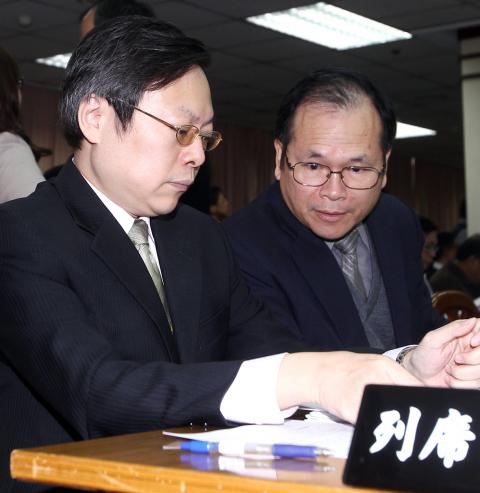Mainland Affairs Council (MAC) Minister Wang Yu-chi (王郁琦) yesterday dismissed Legislative Speaker Wang Jin-pyng’s (王金平) proposal that a “cross-strait affairs panel” be established to report to the legislature to strengthen its supervision of the government, saying that this could lead to a constitutional dispute.
Wang Yu-chi made the remarks before attending the 15th public hearing held by the legislature on the controversial cross-strait service trade agreement.
The legislative speaker put forth the idea on Saturday last week in an attempt to give lawmakers access to cross-strait trade negotiations, saying that the pact caused such controversy because the legislature had been left out of the agreement’s negotiations.

Photo: CNA
He also cited as an example the US’ trade negotiations with other nations, in which two US senators and two US representatives were allowed to participate in and supervise the negotiation process and routinely briefed US Congress on the latest progress.
Lawmakers have made similar suggestions in 2000, proposing that such a panel be led by the legislative speaker and made up of members recommended by various political parties in proportion to the number of their legislative seats.
“There have been calls for the government to set up a mechanism similar to the one implemented by the US for its trade talks to allow [the legislature] to participate in cross-strait trade negotiations. However, the US Congress is only allowed to join the negotiations because it is given the power by the US Constitution to regulate trade with other nations,” Wang Yu-chi said.
The minister added that only a handful of nations, including the US, but not including Taiwan, granted their parliaments such a right.
“The public is advised to take into account the reasons these nations designed their constitutions differently when discussing [the possibility of forming such a panel] to avoid a constitutional conflict,” Wang Yu-chi said.
Democratic Progressive Party caucus whip Ker Chien-ming (柯建銘) said on Saturday last week that the party planned to place Wang Jin-pyng’s proposal on the agenda for the next legislative session, which is to begin on Feb. 21, “as the nation cannot afford to wait any longer.”
Meanwhile, Wang Yu-chi yesterday pledged to stand firm on the government’s position on cross-strait relations during his planned visit to China.
The government’s principal policy toward China remains unchanged — maintaining the “status quo” of “no unification, no independence, no use of force” based on the Republic of China Constitution, Wang Yu-chi said.
The MAC minister is expected to travel to China in the middle of next month to meet with his Chinese counterpart, Taiwan Affairs Office Director Zhang Zhijun (張志軍).
It will be Wang’s first visit to China in his official capacity and the first formal meeting between the two officials tasked with handling ties across the Taiwan Strait.
Seeking to keep Wang Yu-chi on a tight leash during the trip, legislators reached a cross-party consensus last week to forbid him from embarking on any negotiations, signing any papers or issuing any news releases or statements on such political issues as “one China,” the “one China framework,” “one country, two regions,” a “military confidence-building mechanism,” “peace agreement,” or “political relations arrangement in stages.”
The legislators also require that Wang Yu-chi should not accept or echo claims that put the nation’s sovereignty at risk, such as the “one China framework,” or “opposition to Taiwan independence.”
Additional reporting by Tseng Wei-chen

An essay competition jointly organized by a local writing society and a publisher affiliated with the Chinese Communist Party (CCP) might have contravened the Act Governing Relations Between the People of the Taiwan Area and the Mainland Area (臺灣地區與大陸地區人民關係條例), the Mainland Affairs Council (MAC) said on Thursday. “In this case, the partner organization is clearly an agency under the CCP’s Fujian Provincial Committee,” MAC Deputy Minister and spokesperson Liang Wen-chieh (梁文傑) said at a news briefing in Taipei. “It also involves bringing Taiwanese students to China with all-expenses-paid arrangements to attend award ceremonies and camps,” Liang said. Those two “characteristics” are typically sufficient

A magnitude 5.9 earthquake that struck about 33km off the coast of Hualien City was the "main shock" in a series of quakes in the area, with aftershocks expected over the next three days, the Central Weather Administration (CWA) said yesterday. Prior to the magnitude 5.9 quake shaking most of Taiwan at 6:53pm yesterday, six other earthquakes stronger than a magnitude of 4, starting with a magnitude 5.5 quake at 6:09pm, occurred in the area. CWA Seismological Center Director Wu Chien-fu (吳健富) confirmed that the quakes were all part of the same series and that the magnitude 5.5 temblor was

The brilliant blue waters, thick foliage and bucolic atmosphere on this seemingly idyllic archipelago deep in the Pacific Ocean belie the key role it now plays in a titanic geopolitical struggle. Palau is again on the front line as China, and the US and its allies prepare their forces in an intensifying contest for control over the Asia-Pacific region. The democratic nation of just 17,000 people hosts US-controlled airstrips and soon-to-be-completed radar installations that the US military describes as “critical” to monitoring vast swathes of water and airspace. It is also a key piece of the second island chain, a string of

The Central Weather Administration has issued a heat alert for southeastern Taiwan, warning of temperatures as high as 36°C today, while alerting some coastal areas of strong winds later in the day. Kaohsiung’s Neimen District (內門) and Pingtung County’s Neipu Township (內埔) are under an orange heat alert, which warns of temperatures as high as 36°C for three consecutive days, the CWA said, citing southwest winds. The heat would also extend to Tainan’s Nansi (楠西) and Yujing (玉井) districts, as well as Pingtung’s Gaoshu (高樹), Yanpu (鹽埔) and Majia (瑪家) townships, it said, forecasting highs of up to 36°C in those areas